Bass CDs
Bass Players Of Naughty
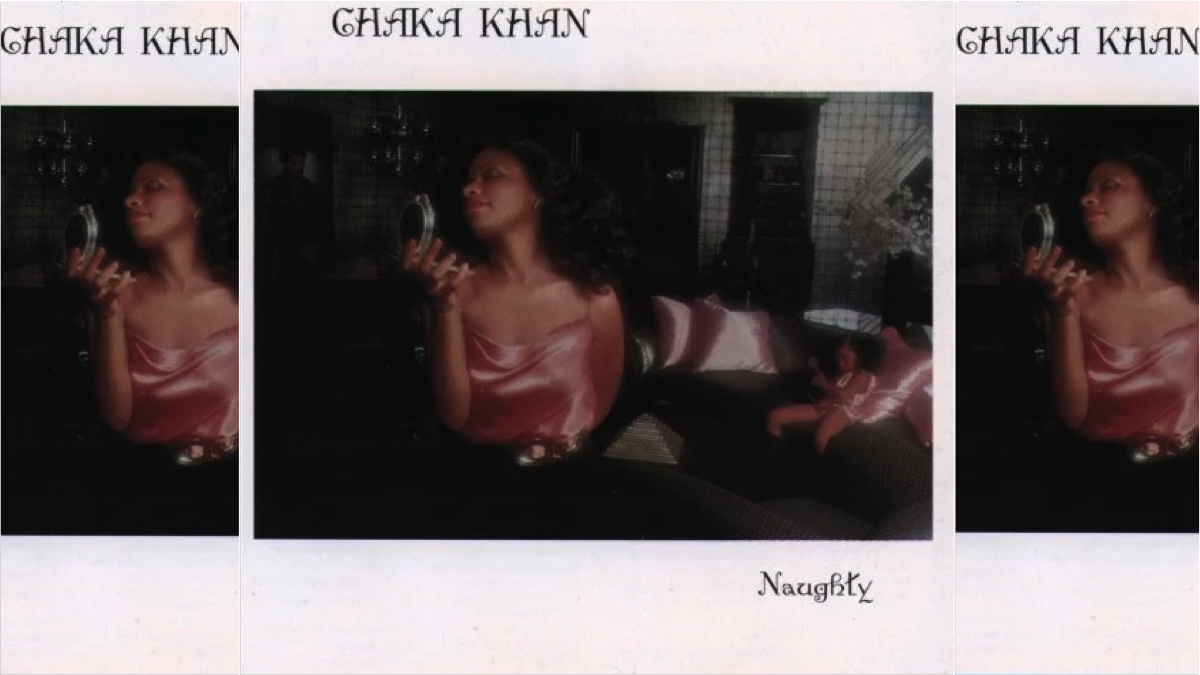
Bass Players Of Naughty…
Chaka Khan needs no introductions. With TEN Grammy awards and an estimated 70 million records sold worldwide, she’s one of the most important female voices of our time.
Chaka’s second record “Naughty” was released in 1980 and even though it didn’t get very high on the charts and it’s not her best-known work, it is considered by many a quintessential record.
“By the early ’80s, Chaka Khan and producer Arif Mardin had a great working relationship that was responsible for her hit solo debut, 1979’s Chaka… Naughty presents the two in a more centered working relationship… most of Naughty represents Khan in a holding pattern, without much material to accommodate her widening range. That being said, Naughty is only a few songs away from being a bona fide classic.” —?Jason Elias, Allmusic
Chaka Khan’s “Naughty” is a goldmine for bass playing, and features an impressive list of artists that makes it, by today’s standard, a classic.
In this article, we’ll talk about some of the best tracks, basslines, and bass players in this record.
Clouds; Anthony Jackson
The album starts with the all-time great Anthony Jackson on the bass. This album features Anthony at his best, with some of his most unique basslines and creative compositions to this day.
For the session, Anthony used his very famous “Career Girl” Fender jazz bass, which featured a 1975 Jazz bass body and a 1973 Fender precision neck, tuned down to a low C (C – F – Bb – Eb).
Anthony’s history with this record is nothing but amazing. Taking from Anthonys’ own words:
“Naughty, which was recorded in New York in 1979, went on without concern for the bass tracks. I was given absolute artistic license, with one exception, and an unheard-of amount of time – three months – to recompose the bass parts, whereupon I notified Arif (Arif Martin, the producer) of my readiness to record. I was given all the studio time that I required. I never found out how much my indulgence cost Chaka, but the end result is as pure an example as exists, in my own case, of the ends justifying the means.”
And boy, was he right! The end result was a bass masterpiece!
The track “Clouds” features a very solid groove that bounces through the track, and also Anthonys’ trademark use of a flanger.
Get Ready, Get Set; Willie Weeks
Bassist number two is the great Willie Weeks, one of the most widely recorded and diverse bass players of our time, Willie played with the likes of Gregg Allman, David Bowie, Eric Clapton, The Doobie Brothers, Stevie Wonder, and the list goes on and on…
In this record, he used his trusty 1962 Fender precision bass, and for this particular track, the bass is doubled with the synth, which was a trend throughout the eighties and gives the line a very bouncy, envelope filter kind of vibe.
Move Me No Mountain; Anthony Jackson
Move Me No Mountain is probably the best-known song on this record and it’s probably due to the absolute masterpiece of a performance by Anthony. The creativity and the virtuosity behind this bass track can’t even be described. The fills, the amount of space, and the choice of notes make this a line worth studying.
Nothings Gonna take You Away; Anthony Jackson
This track feels like Anthony is paying tribute to his bass hero: James Jamerson. His use of space together with Jamerson-inspired Chromaticism makes this track an homage to Motown.
So Naughty; Marcus Miller
Remember this is 1979, Marcus Miller is probably 19 or 20 years old; and he’s already playing at a scary level! Of course, he’s playing his 77 Jazz bass, and his signature slap sound is all over this track, but you can also hear (at around 15 seconds) that he’s showing some bad-ass fingerstyle playing. Marcus is not holding back on this track and he’s taking all the chances he can.
Too Much Love, Anthony Jackson, and Mark Stevens
Mark Stevens, Chakas’s brother, also makes his appearance in this record, and he’s no slouch either. In this track, we can clearly hear Anthonys bouncing quarter notes and Marks slapping over it. This tracks grooves like crazy and it’s a great example of a compromise between two great bass players.
All Night Is All Right; Anthony Jackson
This is a very minimalistic track, there’s not much to it at all. But it’s still incredible what Anthony can do with it. Anthony delivers some of the best fills in this entire record on this track (check out minute 1:00). As usual, the groove is spot on, and it shows that Anthony can also play it simple and lock it in the pocket.
What You Did; Mark Stevens
Mark Stevens slapping in this track with what seems to be a Fender Precision bass. The sound is thick and rubbery and does a great job supporting the brass instruments that are highly featured in this track.
Papillon; Willie Weeks
This was the hit single of the record. Willie Weeks is killing in this track with a sound resembling a Jazz bass and he’s totally locked in with the drum beat. Of notice in this track are the various tasteful and super melodic fills Willie delivers throughout the track.
Our Love is in Danger; Anthony Jackson
And we end the record just as we started, with Anthony Jackson in the lead. This is probably the most disco-sounding track on the record and Anthony’s signature plectrum sound together with his advanced muting technique is all around this track. And of course, Phaser! Anthony’s signature phaser sound that he created around the time of his stint with the OJ’s is also very prominent in this track.
This album is instrumental based and we can hear a lot of different instruments throughout it. But the bass is at the heart of this record. It’s a bass record and it’s stacked with amazing bass grooves and fills. This is a great record to use as a study piece, but also a piece of bass history that should be passed along throughout generations!
Bass CDs
New Campaign: Alberto Rigoni, Nemesis Call – Queens Of Strings
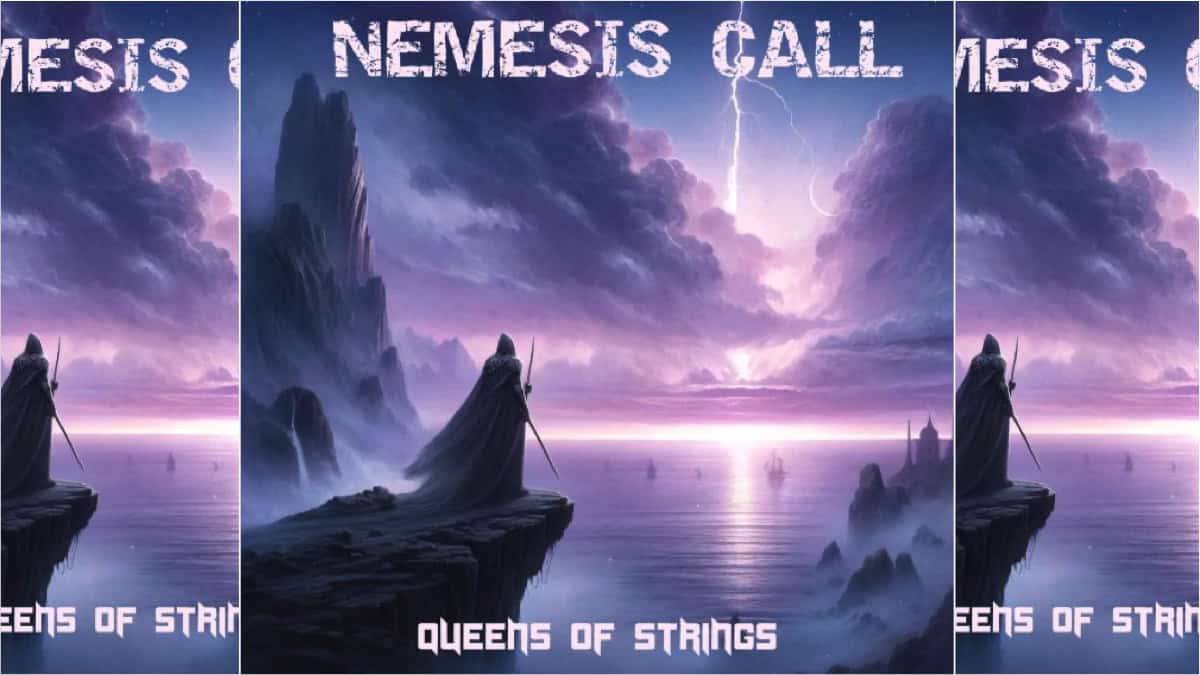
Italian bass master and composer ALBERTO RIGONI is thrilled to announce his brand new project “Nemesis Call – Queens Of Strings”.
Nemesis Call – Queens Of Strings features a super talented drummer from Japan (TBA) and tons of female guitarists such as SAKI, Giusy Busetto, Alexandra Zerner (TBC) and many many others (TBA). Furthermore, Alberto has also launched a Fundraising Campaign for the project. 20% of the income will be donated to Lega del Filo d’Oro legadelfilodoro.it/it, an Italian association that helps deaf and blind children!
Alberto shares:
“Hello friends and music lovers! I’m Alberto Rigoni, an Italian composer and.. a BASS GUY! Between 2008 and 2024 I released 13 solo albums, spanning from progressive, rock, ambient to funky and experimental music, which also features contributions from musicians such as keyboard wizard Jordan Rudess (Dream Theater) drummer Gavin Harrison (Porcupine Tree) and Marco Minnemann (the Aristocrats), keyboardist Kevin Moore (ex Dream Theater), singer John Jeff Soto (ex Goran Edman (ex Y. Malmsteen), bassists Nathan East, Stu Hamm (Joe Satriani), Nik West (ex Prince) and many others. I’m also bass player for BAD As, Sunset Groove Society, Kim Bingham, The Italians bands and co-producer of Mistheria’s Vivaldi Metal Project.”
Alberto on the new project Nemesis Call:
“Even if my latest album “Unexpected Lullabies”, dedicated to my newborn Vittoria Parini Rigoni, will be released on June 4th, 2024, when Vittoria came to life I felt the need to compose new music (yes, I really can’t stop!!!!!). This time will be quite challenging because I’m willing to release an instrumental ambient/prog/rock/metal album, that will feature a talented and young drummer (TBA) and tons of female guitarists (that’s why I will call the album “Queens of the Strings”) such as Alexandra Zerner, YOKA and many others (TBA/TBC)). It won’t be easy to manage all such great musicians but I will make it!! Are you ready to face a new prog experience? The album will be released in Digipack CD and in high-quality digital format approximately at the beginning of 2025.”
The Fundraising Campaign:
As an independent artist, Alberto is looking for supporters who can help him reach the budget for the production (recordings, mix, mastering, artwork etc.) of this new album and has started this fundraising campaign that will end successfully on October 15th, 2024.
Get further information about Alberto Rigoni’s new project Nemesis Call Fundraising campaign at albertorigoni.net/nemesiscal
Bass CDs
New Album: Jake Leckie, Planter of Seeds
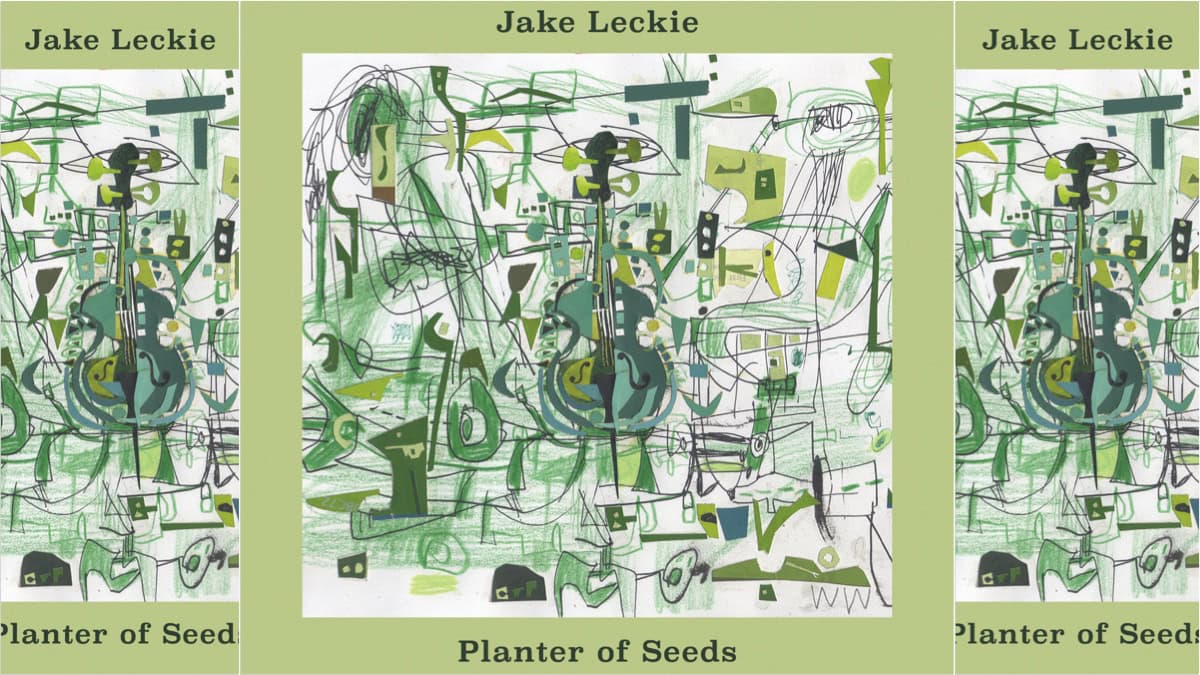
Bassist Jake Leckie and The Guide Trio Unveil New Album Planter of Seeds,
to be released on June 7, 2024
Planter of Seeds is bassist/composer Jake Leckie’s third release as a bandleader and explores what beauty can come tomorrow from the seeds we plant today.
What are we putting in the ground? What are we building? What is the village we want to bring our children up in? At the core of the ensemble is The Guide Trio, his working band with guitarist Nadav Peled and drummer Beth Goodfellow, who played on Leckie’s second album, The Guide, a rootsy funky acoustic analog folk-jazz recording released on Ropeadope records in 2022. For Planter of Seeds, the ensemble is augmented by Cathlene Pineda (piano), Randal Fisher (tenor saxophone), and Darius Christian (trombone), who infuse freedom and soul into the already tightly established ensemble.
Eight original compositions were pristinely recorded live off the floor of Studio 3 at East West Studios in Hollywood CA, and mastered by A.T. Michael MacDonald. The cover art is by internationally acclaimed visual artist Wayne White. Whereas his previous work has been compared to Charles Mingus, and Keith Jarrett’s American Quartet with Charlie Haden, Leckie’s new collection sits comfortably between the funky odd time signatures of the Dave Holland Quintet and the modern folk-jazz of the Brian Blade Fellowship Band with a respectful nod towards the late 1950s classic recordings of Ahmad Jamal and Miles Davis.
The title track, “Planter of Seeds,” is dedicated to a close family friend, who was originally from Trinidad, and whenever she visited family or friends at their homes, without anyone knowing, she would plant seeds she kept in her pocket in their gardens, so the next season beautiful flowers would pop up. It was a small altruistic anonymous act of kindness that brought just a little more beauty into the world. The rhythm is a tribute to Ahmad Jamal, who we also lost around the same time, and whose theme song Poinciana is about a tree from the Caribbean.
“Big Sur Jade” was written on a trip Leckie took with his wife to Big Sur, CA, and is a celebration of his family and community. This swinging 5/4 blues opens with an unaccompanied bass solo, and gives an opportunity for each of the musicians to share their improvisational voices. “Clear Skies” is a cathartic up-tempo release of collective creative energies in fiery improvisational freedom. “The Aquatic Uncle” features Randal Fisher’s saxophone and is named after an Italo Calvino short story which contemplates if one can embrace the new ways while being in tune with tradition. In ancient times, before a rudder, the Starboard side of the ship was where it was steered from with a steering oar. In this meditative quartet performance, the bass is like the steering oar of the ensemble: it can control the direction of the music, and when things begin to unravel or become unhinged, a simple pedal note keeps everything grounded.
The two trio tunes on the album are proof that the establishment of his consistent working band The Guide Trio has been a fruitful collaboration. “Santa Teresa”, a bouncy samba-blues in ? time, embodies the winding streets and stairways of the bohemian neighborhood in Rio de Janeiro it is named for. The swampy drum feel on “String Song” pays homage to Levon Helm of The Band, a group where you can’t always tell who wrote the song or who the bandleader is, proving that the sum is greater than the individual parts. Early jazz reflected egalitarianism in collective improvisation, and this group dynamic is an expression of that kind of inclusivity and democracy.
“The Daughters of the Moon” rounds out the album, putting book ends on the naturalist themes. This composition is named after magical surrealist Italo Calvino’s short story about consumerism, in which a mythical modern society that values only buying shiny new things throws away the moon like it is a piece of garbage and the daughters of the moon save it and resurrect it. It’s an eco-feminist take on how women are going to save the world. Pineda’s piano outro is a hauntingly beautiful lunar voyage, blinding us with love. Leckie dedicates this song to his daughter: “My hope is that my daughter becomes a daughter of the moon, helping to make the world a more beautiful and verdant place to live.”
Bass CDs
Debut Album: Nate Sabat, Bass Fiddler
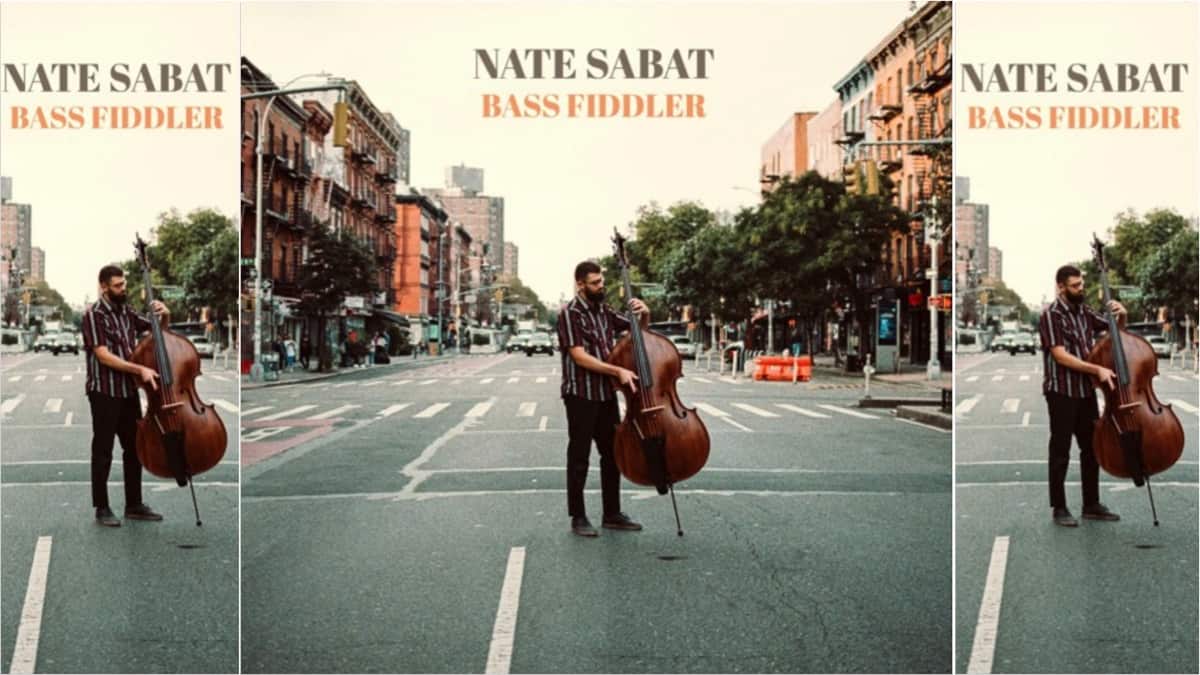
In a thrilling solo debut, bassist Nate Sabat combines instrumental virtuosity with a songwriter’s heart on Bass Fiddler…
The upright bass and the human voice. Two essential musical instruments, one with roots in 15th century Europe, the other as old as humanity itself.
On Bass Fiddler (Adhyâropa Records ÂR00057), the debut album from Brooklyn-based singer-songwriter and bass virtuoso Nate Sabat, the scope is narrowed down a bit. Drawing from the rich and thriving tradition of American folk music, Sabat delivers expertly crafted original songs and choice covers with the upright bass as his lone tool for accompaniment.
The concept was born a decade ago when Sabat began studying with the legendary old-time fiddler Bruce Molsky at Berklee College of Music. “One of Bruce’s specialties is singing and playing fiddle at the same time. The second I heard it I was hooked,” recalls Sabat. “I thought, how can I do this on the bass?” From there, he was off to the races, arranging original and traditional material with Molsky as his guide. “Fast forward to 2020, and I — like so many other musicians — was thinking of how to best spend my time. I sat down with the goal of writing some new songs and arranging some new covers, and an entire record came out.” When the time came to make the album, it was evident that Molsky would be the ideal producer. Sabat asked him if he’d be interested, and luckily he was. “What an inspiration to work with an artist like Nate,” says Molsky. “Right at the beginning, he came to this project with a strong, personal and unique vision. Plus he had the guts to try for a complete and compelling cycle of music with nothing but a bass and a voice. You’ll hear right away that it’s engaging, sometimes serious, sometimes fun, and beautifully thought out from top to bottom.”
While this record is, at its core, a folk music album, Sabat uses the term broadly. Some tracks lean more rock (‘In the Shade’), some more pop (‘White Marble’, ‘Rabid Thoughts’), some more jazz (‘Fade Away’), but the setting ties them all together. “There’s something inherently folksy about a musician singing songs with their instrument, no matter the influences behind the compositions themselves,” Sabat notes. To be sure, there are plenty of folk songs (‘Louise’ ‘Sometimes’, ‘Eli’) and fiddling (‘Year of the Ox’) to be had here — the folk music fan won’t go hungry. There’s a healthy dose of bluegrass too (‘Orphan Annie’, ‘Lonesome Night’), clean and simple, the way Mr. Bill Monroe intended.
All in all, this album shines a light on an instrument that often goes overlooked in the folk music world, enveloping the listener in its myriad sounds, textures, and colors. “There’s nothing I love more than playing the upright bass,” exclaims Sabat. “My hope is that listeners take the time to sit with this album front to back — I want them to take in the full scope of the work. I have a feeling they’ll hear something they haven’t heard before.”
Available online at natesabat.bandcamp.com/album/walking-away
Bass CDs
New Album: Avery Sharpe, I Am My Neighbors Keeper
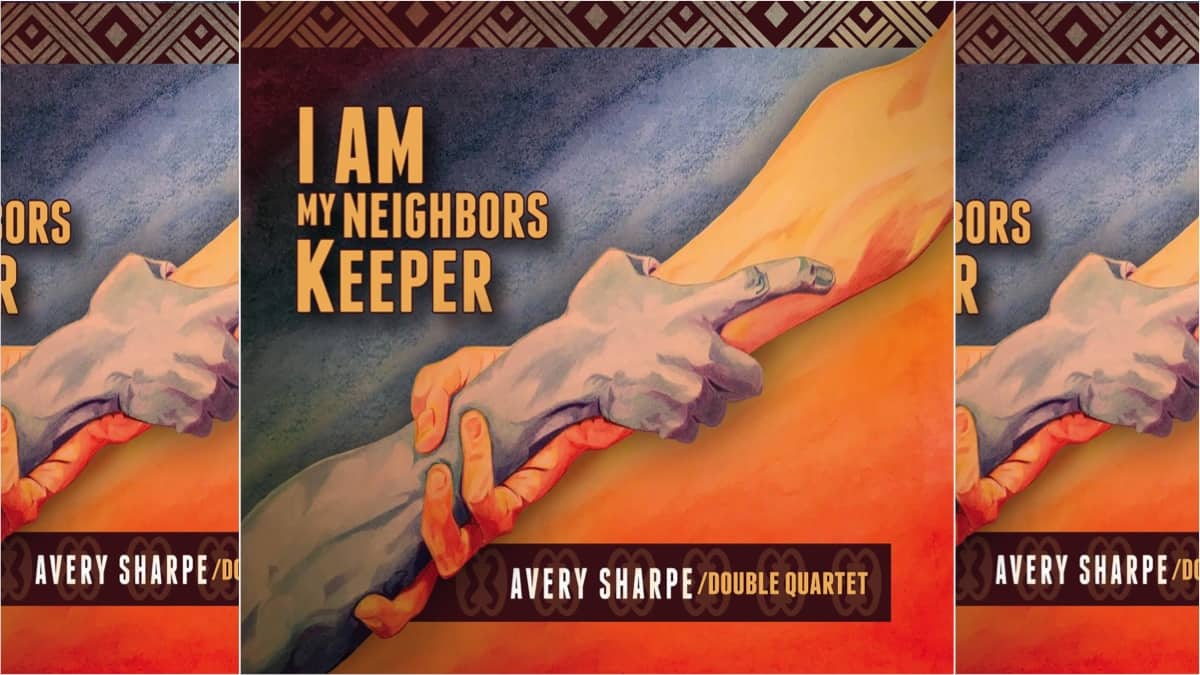
Avery Sharpe and his Double Quartet to release, I Am My Neighbors Keeper
A new recording will be released on JKNM Records by internationally renowned bassist/composer Avery Sharpe, “I Am My Neighbors Keeper” is scheduled for release in June 2024.
Sharpe has composed a new work that highlights our commitment to one another. Avery initiated the project as a response to the political and racial division that has grown over the past seven years in the country. “The U.S political climate has drastically changed in the past 40-plus years, especially during the last seven of those years. In this age of greed, which Sharpe refers to as “IGM,” I Got Mine, basic human compassion has been eroded. Racial, economic and social strides are being turned back.
“We have food insecurity, the unhoused, pandemics, school shootings, domestic violence, and an opioid problem, just to name some. There is a need to remind people that each of us is here on this planet for a very short period of time. It doesn’t matter if one has a religious approach or a secular approach, it all comes down to concern and compassion for each other. Through these compositions and recordings, Avery’s mission as an artist is to remind us that we all are interconnected and that ‘We Are Our Neighbor’s Keeper.’ When we help to uplift one, we uplift everyone,” Sharpe said.
Each movement in the piece describes the values we should strive for to help one another for this multi-media (video slide show during performance) and multi-discipline performance.
Many of Sharpe’s projects and recordings have been about “standing on the shoulders of ancestors, heroes and sheroes.” Among his recordings and projects, include “Running Man” (celebrating the athlete Jesse Owens), “Ain’t I A Woman” (about Sojourner Truth), and his most recent project “400: An African American Musical Portrait” (marking the 400 years from 1619 to 2019).
Avery Sharpe has recorded and performed with many jazz greats from Dizzy Gillespie to Yusef Lateef. He had an illustrious run of 20 plus years with the legendary Jazz pianist McCoy Tyner, of which he recorded more than 25 records with Mr. Tyner and performed countless worldwide concerts.
Visit online at averysharpe.com/
Bass CDs
New Album: Killing Bees, Racing Towards Ruin

Killing Bees Racing Towards Ruin out May 10th via Tonequake Records.
There are some records where the first note grabs you and doesn’t let go. Before the first lyric is sung, Killing Bees pull you into Racing Towards Ruins via the sheer power of TONES, MAN, TONES. Brown-note bass reverberations and gut-punch kickdrum snap the listener out of daily reverie instantaneously. Together, bassist/vocalist Nic Nifoussi and drummer Ray Mehlbaum (both of Automatic 7) and producer Andrew Scheps (Mars Volta, Audioslave, Adele) have crafted a piece of art that fuses low-rock minimalism, post-hardcore aggression, and SoCal throttle rock urgency into, well, a real ass-kicker.
The bones of Killing Bees began their calcification when Nifoussi started a high school punk band called Automatic 7. They signed to BYO Records upon graduation and soon found themselves in need of a new drummer. Enter Ray Mehlbaum. Tours with Bad Religion, Social Distortion, Face 2 Face, Bouncing Souls, Suicide Machines, Unwritten Law, Youth Brigade, DOA, and others followed, as well as a deal with A&M Records. A&M got bought by Universal, the band moved to Vagrant Records, cut a new record, toured, then broke up.
“Eventually, Ray and I decided to start a two-piece band” explains Nifoussi. “I was trying out a new sound using 2 amps and an A-B switch. Overdrive through one amp and playing a lot of chords to get a guitar-like sound. After years of playing together, we were already tight and used to writing together. The songs came quickly and easily.”
Via Brett Gurewitz of Bad Religion, the band had come to know Grammy-winning producer and engineer Andrew Scheps. Though originally recommended as a producer for Automatic 7, when the band played him the Killing Bees songs, he loved the concept and the trio got to work on their self-titled debut. Following the record’s release on Guano Loco/Loose Fang Records, “we played a bunch of shows and eventually started writing the new record in our North Hollywood lockout” says Nifoussi.
Recorded once again at Scheps’ studio, drums and bass were recorded live, the only overdubs being vocals and some bass and accordion textures (Nifoussi is an accomplished accordionist). “We tracked the two together over 4 or 5 days and everything you hear was played live by talented humans, not put together after the fact. I think that live energy is what makes the record so compelling!” says Scheps. “Andrew wanted to challenge us. We came in wired towards traditional songwriting – he wasn’t interested in that” explains Mehlbaum. “He encouraged us to think about instrumental bits that would drive the tune, as opposed to the sing-along chorus of a traditional song. As a drummer, he kicked my ass. I remember him saying “we’re gonna turn the click off. I want you to go completely ‘out of time’ then come back in.” That’s some crazy shit! But I fucking loved it.”
Thematically, the record deals with the dangers of love and politics in equal measure. As Nifoussi puts it, “if there’s a takeaway, it’s to be careful with who you love… and vote into government.” So, Racing Towards Ruin. A concise, compelling listen, arresting at first blush, and deeply moving upon completion. A modern rock record (not a modern-rock record), unrelentingly heavy and sonically immaculate. And loud. Super loud.















